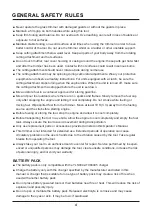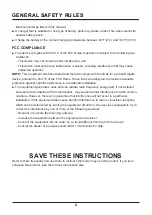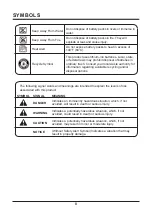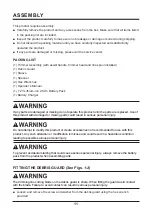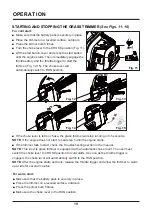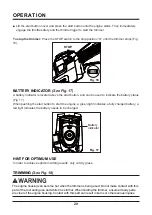
GENERAL SAFETY RULES
■
Do not dispose of battery packs in fire. They will explode or leak and cause injury. Liquid
ejected from the battery may cause irritation or burns.
■
Do not crush, drop or damage the battery pack. Do not use a battery pack or charger that has
been dropped or received a sharp blow. A damaged battery is subject to explosion. Properly
dispose of a dropped or damaged battery immediately.
■
Batteries can explode in the presence of a source of ignition, such as a pilot light. To reduce the
risk of serious personal injury, never use any cordless product in the presence of open flame.
An exploded battery pack can propel debris and chemicals. If exposed, flush with water
immediately.
■
Under extreme usage or temperature conditions, battery pack leakage may occur. If liquid
comes in contact with your skin, wash immediately with soap and water, then neutralize with
lemon juice or vinegar. If liquid gets into your eyes, flush them with clean water for at least 10
minutes, then seek immediate medical attention.
■
When the battery pack is not in use, keep it away from other metal objects like: paper clips,
keys, nails, screws, or other small metal objects that can make a connection from one terminal
to another. Shorting the battery pack terminals together may cause sparks, burns, or a fire.
■
Do not expose a battery pack to fire or excessive temperature. Exposure to fire or temperature
above 265°F (130°C) may cause an explosion.
■
Do not modify or attempt to repair the battery pack (as applicable) except as indicated in the
instructions for use and care.
■
Follow all charging instructions and do not charge the battery pack outside the temperature
range specified in the instructions. Charging improperly or at temperatures outside of the
specified range may damage the battery and increase the risk of fire.
BATTERY CHARGER
■
This charger is only compatible with a 07LB2001-S lithium-ion battery.
■
To reduce the risk of injury, charge only the specified lithium-ion rechargeable batteries. Other
types of batteries may burst, causing personal injury or damage.
■
Do not charge the battery in a damp or wet location. Following this rule will reduce the risk of
electric shock.
■
Keep the cord and charger away from heat to prevent damage to housing or internal parts.
■
Do not operate charger with a damaged cord or plug, which could cause shorting and electric
shock. If damaged, immediately discontinue use. Replace the charger with an identical model
as listed in this manual.
■
Do not use a charger that has been dropped or received a sharp blow.
■
Do not disassemble charger. Take it to a qualified service center to be checked or replaced.
Incorrect reassembly may result in a risk of electric shock or fire.
■
Do not abuse the charger cord. Never use the cord for carrying, pulling or unplugging.
■
Keep the cord away from heat, oil, sharp edges or moving parts. Damaged or entangled cords
increase the risk of electric shock. If the charger cord is damaged, replace the charger with an
5
Summary of Contents for NPTGSS2617A
Page 35: ...NPTGSS2617A EXPLODED VIEW EXPLODED VIEW 35...
Page 37: ...EXPLODED VIEW 26CC 2 CYCLE ENGINE 37...
Page 39: ...39 NOTES...
Page 40: ...NOTES 40...
Page 75: ...NPTGSS2617A VISTA EN DETALLE VISTA EN DETALLE 75...
Page 77: ...77 VISTA EN DETALLE DEL MOTOR DE 2 TIEMPOS DE 26 CC...
Page 79: ...79 NOTAS...
Page 80: ...NOTAS 80...




